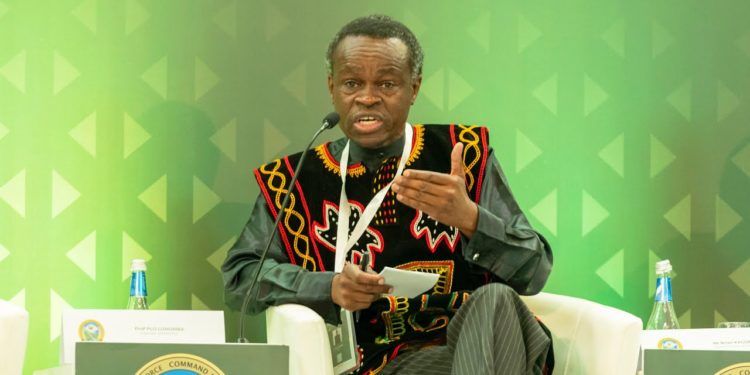Prominent lawyer and former Director of Kenya’s Anti-Corruption Commission, Prof. Patrick Loch Otieno Lumumba has delivered a sharp critique of President William Ruto’s administration, warning that the country is “on the wrong path” and faces a deepening crisis in governance, ethnicity, and economic mismanagement.
Speaking on Spice FM, Prof. Lumumba, an outspoken figure on issues of governance and corruption in Kenya, used the platform to voice his concerns over the current state of the nation. He argued that while Kenya’s leadership has consistently failed to address critical issues, it is the people of Kenya who bear the brunt of this failure.
“The country is unhappy,” Lumumba said, emphasizing the growing dissatisfaction among Kenyans. “We are on the wrong path, and the back stops with the president.” He referenced his earlier letters to President Ruto, which have yet to be responded to, stating that while African leaders rarely engage in such correspondence, he felt it was his duty as a citizen to raise the alarm on behalf of the public.
Lumumba’s critique of the administration is wide-ranging, targeting economic policies, ethnic politics, and the government’s failure to deliver meaningful reforms. One of his primary concerns is the government’s handling of the economy, especially the controversial Finance Bill, which led to widespread protests earlier this year, particularly among the youth. Lumumba acknowledged the protests by the younger generation but pointed out that the administration has since neutralized the threat by forming political alliances that dilute public anger.
“Never in the history of any country have I seen a president return a bill with all provisions deleted,” Lumumba said, referring to the Finance Bill debacle. He further lamented how the recent political alliance between President Ruto and opposition leader Raila Odinga has ethnicized Kenya’s politics and muted potential opposition. According to Lumumba, the president is now confident that “he has settled the political temperature” but has done so at the cost of the nation’s long-term stability.
One of the most pressing themes during the interview was the role of ethnicity in Kenyan politics. Lumumba did not mince words, decrying how tribal loyalties continue to undermine national progress. He expressed frustration at how leaders are shielded from accountability by ethnic politics, often defended by their communities despite accusations of corruption or incompetence.
“If you arrest anybody, people say, ‘He is a thief, but he’s our thief.’ That’s the tragedy of our politics,” Lumumba stated, adding that this blind defense of impunity has crippled Kenya’s governance. He argued that true leadership demands moving beyond tribalism and focusing on national interests, a goal he believes the current administration is failing to meet.
The conversation also touched on the rising discontent among Kenya’s middle class and youth, who have increasingly voiced frustration with the government’s inaction. Lumumba pointed to the youth-led protests earlier in the year as evidence that Kenyans are beginning to demand more accountability. However, he lamented that these movements are often short-lived due to political maneuvering and the ethnicization of public grievances.
“When Kenyans are angry, they will sustain the protest,” he noted, drawing parallels to successful mass protests in Sudan and Bangladesh that forced political change. Lumumba warned that if the government continues to ignore the demands of its people, Kenya risks descending into unrest. “Revolution is the language of the unheard,” he warned, implying that the patience of the Kenyan public may soon run out.
Lumumba also critiqued the government’s handling of key sectors such as healthcare, education, and taxation. He labeled the implementation of the Competency-Based Curriculum (CBC) as a failure, attributing it to poor planning and lack of funding. “We cannot experiment with education,” he said, urging for a comprehensive overhaul of the system. On healthcare, he pointed out the corruption plaguing the National Health Insurance Fund (NHIF), arguing that structural changes without addressing the underlying culture of theft would not solve Kenya’s healthcare challenges.
Despite his harsh criticisms, Lumumba offered solutions, calling for leadership that walks the talk and puts national interests ahead of political expediency. He urged the president to appoint qualified individuals to key positions and allow them to operate autonomously, free from political interference. “If you put the right individuals in the right places and give them the opportunity to serve without undue interference, then we would be on the proper trajectory,” Lumumba stated.
Lumumba closed the interview with a stark warning: If the current path continues, Kenya risks not only political instability but also economic and social collapse. He urged citizens to hold their leaders accountable, warning that time is running out to correct the course.












